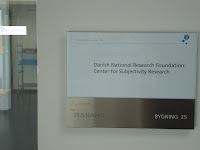I have about a five minute walk to the Metro station from our flat, an eight minute ride to my stop, and then another five minute walk to my office. Not a bad commute! And here's what I see when I get to campus:
It's a very sleek, clean and angular campus. It's quite different from Purdue and Southern Illinois University, aesthetically speaking. The facilities are very new and really top-notch. I certainly can't complain. I have a bright office and a brand-new computer.
So what sort of work goes on at the Danish National Research Foundation: Center for Subjectivity Research, exactly?
 I don't have a neat definition of "subjectivity", I'm afraid. It's a term that shows up in all sorts of philosophical discussions but it's rarely defined with any precision. That said, here's a shot at some clarity: "Subjectivity", as I use the term, has to do with the various features of our experiential life as conscious, world-engaged subjects. In other words, it has to do with different aspects of our experience of "self". My own research deals primarily with the nature of consciousness--clearly a central feature of human subjectivity and selfhood. I'm inclined to think that any consideration of consciousness as such has to include questions about embodiment (how bodily structures shape different forms of consciousness), perception (how things in the world present themselves in our experience of them), agency (or how bodily action affects the content of conscious states), intersubjectivity (how we relate to and understand other conscious subjects), and lots of other things like reflection, emotion, affectivity, preconscious drives, instincts, forms of empathy, language-use, etc. In other words, "subjectivity" seems to encompass the entire range of different types of conscious experience that, individually and collectively, make up our sense of being a "self". But I don't confine myself to abstract philosophical discussion. I try to make things a bit more concrete by drawing upon empirical research taken from various cognitive sciences including neuroscience, cognitive and developmental psychology, artificial intelligence, linguistics, and things of that sort. Additionally, I tend to draw heavily upon theories of mind found in Eastern philosophy, including Hinduism, Buddhism and Daoism. To sum up: my research is an interdisciplinary and cross-cultural investigation into the relationship between mind and world. Not that complicated, really...
I don't have a neat definition of "subjectivity", I'm afraid. It's a term that shows up in all sorts of philosophical discussions but it's rarely defined with any precision. That said, here's a shot at some clarity: "Subjectivity", as I use the term, has to do with the various features of our experiential life as conscious, world-engaged subjects. In other words, it has to do with different aspects of our experience of "self". My own research deals primarily with the nature of consciousness--clearly a central feature of human subjectivity and selfhood. I'm inclined to think that any consideration of consciousness as such has to include questions about embodiment (how bodily structures shape different forms of consciousness), perception (how things in the world present themselves in our experience of them), agency (or how bodily action affects the content of conscious states), intersubjectivity (how we relate to and understand other conscious subjects), and lots of other things like reflection, emotion, affectivity, preconscious drives, instincts, forms of empathy, language-use, etc. In other words, "subjectivity" seems to encompass the entire range of different types of conscious experience that, individually and collectively, make up our sense of being a "self". But I don't confine myself to abstract philosophical discussion. I try to make things a bit more concrete by drawing upon empirical research taken from various cognitive sciences including neuroscience, cognitive and developmental psychology, artificial intelligence, linguistics, and things of that sort. Additionally, I tend to draw heavily upon theories of mind found in Eastern philosophy, including Hinduism, Buddhism and Daoism. To sum up: my research is an interdisciplinary and cross-cultural investigation into the relationship between mind and world. Not that complicated, really...Since I'm starting to bore myself, I'll end on an egocentric note by posting a random shot of me standing on a bridge in a lovely park near our flat.



No comments:
Post a Comment